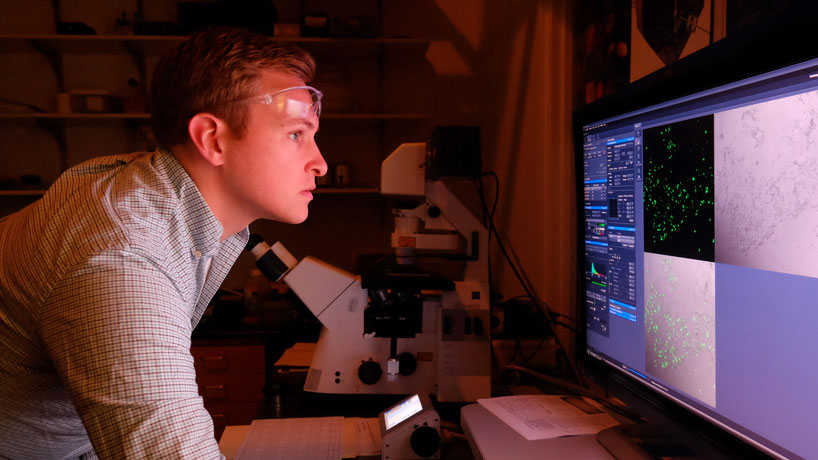
Joe Meisel, a doctoral student in chemistry, views cells that glow green after successful “transfection” of DNA, a method that could build to a future cure for genetic disease. The research won him the 2015 Ciel DeGutis Award. (Photo by August Jennewein)
Joe Meisel is making a name for himself at the University of Missouri–St. Louis. First he received widespread media attention for the beer brewing course he designed and implemented as a UMSL doctoral student in chemistry. Now he is the winner of the 2015 Ciel DeGutis Award for Research Excellence.
And it’s not for beer science, as one may think, but rather for his work in supramolecular chemistry, which examines how separate molecules interact with each other. Meisel has been researching membrane transport, the process of inserting compounds into a molecule past the cell’s protective membrane layer. He specifically focuses on inserting DNA into the molecule, a process called “transfection,” but the process can be used to introduce antibiotics as well.
“The whole goal of it is twofold,” Meisel said. “One, getting DNA into a cell is useful for biology researchers to test the functions of genes. Second, it’s also kind of a step away from gene therapy, so using DNA to cure genetic diseases.
“DNA is kind of this magic molecule that’s responsible for so much of what we are and who we are, so understanding how certain chemicals interact with DNA and how we can use DNA to cure disease, I find that incredibly interesting.”
His research, while at the very first stages of that process, will hopefully lead to progress toward curing genetic diseases like cystic fibrosis, Huntington’s disease and muscular dystrophy, to name a few.
Supramolecular chemistry is an area of study Meisel has been interested in since his undergraduate years at Indiana University in Bloomington.
“It’s a field right at the edge of chemistry and biology,” he said. “What I like about it is taking a chemist’s perspective and applying it to biological problems. Chemists think about structures in a different way than biologists are trained to, so we each bring different ideas to the table.”
He came to UMSL specifically to study with George Gokel, Distinguished Professor of Science and director of UMSL’s Center for Nanoscience.
“My old boss from Indiana said, ‘You need to work with George Gokel,’” Meisel said. “He’s really well known in the field. And he’s a great professor, so I was very happy to get into his lab.”
Now Gokel is the one recognizing Meisel.
The Ciel DeGutis Award, endowed by Gokel himself, is in honor of his wife’s grandmother and is presented annually to a student associated with the Center for Nanoscience who has made a significant contribution to the field of nanoscience.
Meisel wrapped up his fourth year in the doctoral program and is currently the president of the Chemistry Graduate Student Association as well as an advisor for the Students and Teachers As Research Scientists summer program at UMSL. He hopes to graduate next May and go on to a post-doctoral fellowship.
“The research I’m doing right now, I really enjoy. I think no matter what type of research I end up doing, it will always be at that interface of biology and chemistry.”















